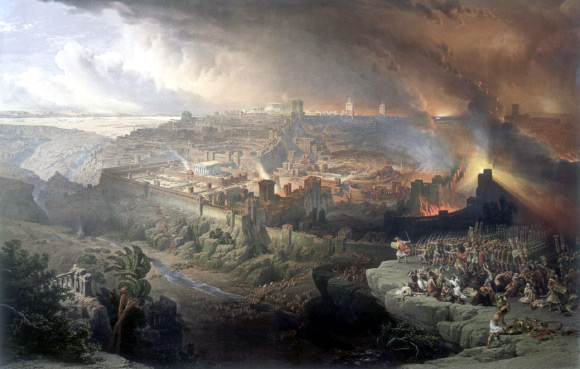Israeli archaeologists have unearthed four artifacts that they believe date back to the time of the siege of Jerusalem in the 1st century CE.

The siege and destruction of Jerusalem – painting by David Roberts
Three well-preserved cooking pots and a small ceramic oil lamp have been uncovered inside a small cistern by the team from the Israel Antiquities Authority (IAA).
“This is the first time we are able to connect archaeological finds with the famine that occurred during the siege of Jerusalem at the time of the Great Revolt,” explained Dr Eli Shukron in a statement from the IAA.
“The complete cooking pots and ceramic oil lamp indicate that the people went down into the cistern where they secretly ate the food that was contained in the pots, without anyone seeing them, and this is consistent with the account provided by Josephus (a first-century Romano-Jewish historian who witnessed the sack of Jerusalem).”

Cooking pots and a small ceramic oil lamp found in a cistern in Jerusalem (Vladimir Naykhin)
In his book The Jewish War, Josephus describes the Roman siege of Jerusalem: “these concealed the food they possessed for fear it would be stolen by the rebels and they ate it in hidden places in their homes.
As the famine grew worse, the frenzy of the partisans increased with it. For as nowhere was there corn to be seen, men broke into the houses and ransacked them. If they found some they maltreated the occupants for saying there was none; if they did not, they suspected them of having hidden it more carefully and tortured them.
Many secretly exchanged their possessions for one measure of corn-wheat if they happened to be rich, barley if they were poor. They shut themselves up in the darkest corners of the their houses, where some through extreme hunger ate their grain as it was, others made bread, necessity and fear being their only guides. Nowhere was a table laid.”
______
Bibliographic information: Josephus. The Jewish War. Translated by G.A. Williamson, 1959; pp. 290







